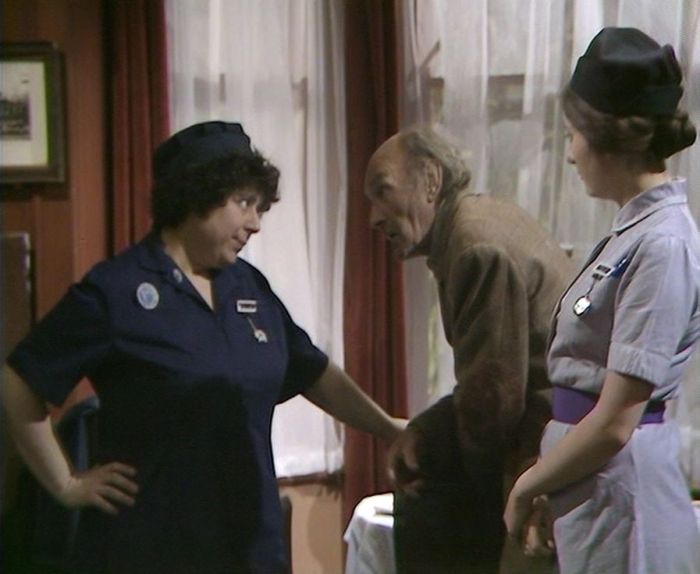
Paula Milne’s Walkabout wastes no time in repositioning Maureen as both judgemental and close-minded. In the first scene, which sees Pat tossing a few pennies towards a street busker (as she does every day), the division between Maureen and her closest friend is marked. Despite previously being depicted as an open and embracing person, Maureen has now morphed into a much harsher character (for example, telling Pat that people living on the streets have made their own choice).
The new Maureen is discussed by Pat and Jo in a later scene. Pat is of the opinion that her friend has now become the perfect nurse (which isn’t a compliment – Pat contending that her responses to the patients are now mechanical rather than honest).
The reason for this set-up becomes obvious when we observe Maureen spending the majority of the episode shadowing community health nurse June Morris (Miriam Margolyes). June is everything that Maureen isn’t – a freewheeling, impulsive person who thrives outside of the regimented hospital set-up (describing it as an isolating cocoon).
In the wide world there’s no doctor or senior nurse to turn to, meaning that the community nurse has to operate autonomously – June revels in this, but looks as if it’ll come harder to Maureen. June then explains that the patient/nurse dynamic is totally different when making a home visit – in hospital the patients are rather dependent whilst at home they’re in their own environment and therefore more confident.
Maureen, continuing to be written in a somewhat negative light, wonders why they simply aren’t all shipped off into care homes. This is a somewhat unfeeling attitude and is the type of comment that later causes Pat, in a moment of anger, to label her a bigot.
The first notable patient on June’s round is Mrs Faulkener (Natalie Kent). Her health may be failing but she’s still gloriously combative. As June gives her a bath, Mrs Faulkener reflects on old age and the poor quality of presents she receives. “That’s what happens when you’re older, people think all you want is lavender, talcum powder and manicure sets”.
Mind you, she has had an impressive present recently – a plant which is currently taking pride of place in the bathroom. A gift from her son, who otherwise apparently rarely seems to visit, Mrs Faulkener has elected to coat the leaves in nail varnish. When an appalled Maureen tells her that this will cause the plant to die, the old lady counters with the observation that at least it’ll look nice for a while. This is impeccable logic.
The lion’s share of the episode revolves around today’s major guest star, Maurice Denham (as Jack Knight). A former academic and a current alcoholic, Jack is gifted several well-written monologues by Milne as well as numerous other sharp lines. Here, he’s reflecting on the difference between his imaginary picture of nurses and what he actually discovered when he spent some time at St Angela’s.
On the one hand, the Florence Nightingale variety – a silent gowned figure gliding in and out of a dimly-lit ward, bearing a lamp to symbolise the virtue of her calling. And then there’s the other sort – the type depicted in low-budget comedy films with skirts up their backsides and a knowledge of the male anatomy gained through practical research, rather in the classroom.
But what did I find in reality? Heavy-legged girls, white with ferocious vocation, or off-hand creatures with one eye on the clock and the other on their unfortunate patient’s grapes.
Maureen, left alone with him for a while, crosses verbal swords with the combative Jack. No doubt by the end of their time together, as she witnesses Jack in all his many guises (from articulate to broken), she’s learnt something of value. Denham is as good as you’d expect whilst Erin Geraghty more than holds her own. The sight of a subdued Maureen, returning to the hospital to join the others in wishing a safe passage to Sita (who’s heading off to India), shows us that some of her dogmatic views have taken a knock.
This is the point of the story of course and whilst it could have come across as a little contrived, the fact that Denham was given so much material (and delivered it so well) proves to be a major plus. And it was pleasing to close series two with a story centered around Maureen, a character who tended to be sidelined during most of this run.
Building on the groundwork of the first series, Angels continued to impress during this second series. That it’s not better appreciated is a shame, as the fusion of actors, writers and directors certainly produced something rather special. Maybe one day Simply will relent and release series three on DVD ….




